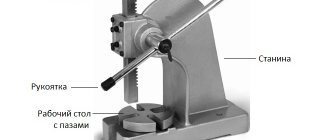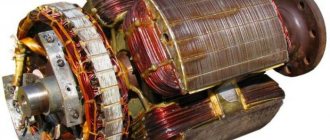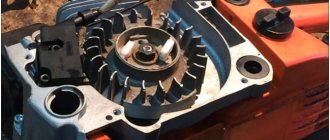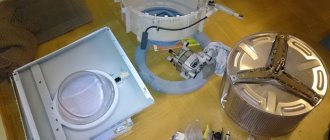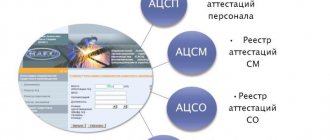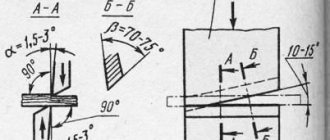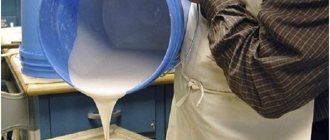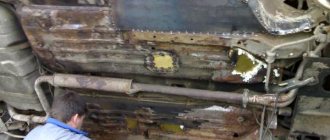To search for scrap metal, there are special devices called metal detectors and ground penetrating radar. These are devices that, with a great degree of accuracy, determine metal objects located at different depths. Meanwhile, the cost of such a device is quite high and may simply be unaffordable for a digger. So the question of how to find metal underground without expensive instruments is very acute among specialists in this field.
Choosing a metal detector
This is where the journey of any recycled metal collector should begin. Which metal detector is best for finding scrap metal? In fact, almost any - brand and price do not play a special role. Even the simplest and cheapest device can find metal underground. Moreover, by choosing an expensive professional metal detector, you significantly increase its payback period. Is it worth it?
An inexpensive model for 5,000-6,000 rubles will pay for itself in the near future: for this you only need to hand over about a ton of metal. But if you bought an expensive metal detector for 40-50 thousand, then consider for yourself how much effort and time you need to spend to “recoup” this money.
Some will argue that professional metal detectors are better and cost more for a reason. Of course, their search radius is larger, they search deeper, and they distinguish between ferrous and non-ferrous metals very well. The question here is whether these characteristics are important to you. After all, if recycled metal is collected for delivery, then its type does not matter. The depth of occurrence also does not play a special role. Ferrous metal occurs in large sizes, and, as a rule, even the weakest metal detector can “feel” it.
How to find scrap metal in the ground without a metal detector?
Contrary to the generally accepted opinion that the best device for detecting metal is the above-mentioned expensive equipment, such simple devices as:
- metal rods, vines. They are a pair of steel or aluminum rods bent at right angles. These kind of antennas are able to “see” weak signals of the electromagnetic field. Such signals are a consequence of the presence of various anomalies in the soil, including metals. The disadvantage of this search method is that the vine picks up radiation not only from metal objects, but also from ordinary voids in the ground;
- pendulum. It is a sphere made of thick cardboard and suspended on a cotton thread, the length of which is determined by experiment. The outer part of the sphere should be wrapped in metal foil. According to experienced diggers, this seemingly dubious method of detecting metal is actually quite effective;
- pits. It is a search method using sequential soil removal. To do this, trenches are most often dug both in depth and in breadth. This method is quite effective, but very labor-intensive. Therefore, its use at random is not recommended. It is better to carry out digging after searching with a pendulum or a vine.
Although these simple devices are inferior in some characteristics to professional equipment, they have quite tangible success.
Where to look for scrap metal?
Once you’ve decided on the equipment, it’s time to think about where to look for scrap metal. Promising areas are fields, and it does not matter whether they are currently being cultivated or not. After all, there may be a lot of broken parts from equipment that were previously left right on the field. Pay special attention to the edges. Working with a metal detector in this way, you can collect up to 200 kg from one field in just a couple of hours of work.
It is also worth looking into agricultural buildings: barns, farms, haylofts and others. Don't avoid industrial buildings such as repair shops, abandoned hangars and workshops, forges and car repair shops. A lot of non-ferrous metal can be found in industrial waste landfills, but the competition for them is serious. If you're lucky, you can find spent cartridges at an abandoned firing range.
But where you shouldn’t go is to places of potential recreation for people. There are often a lot of cans and beer cans, as well as other garbage. So the metal detector signals will be simply useless.
Where can you find a lot of copper for scrap metal?
Copper scrap is the most expensive raw material, which is in great demand in the secondary metal market. Dozens of companies offer to sell copper in Moscow at a favorable price, since the importance of this non-ferrous metal on a national scale is difficult to overestimate. There are many options for finding copper, for example the following:
- broken home appliances (TVs, washing machine, vacuum cleaner, refrigeration unit, electric stove, water intake station) have a fairly large amount of valuable wire in the motor windings;
- in most farms and utility rooms, unclaimed, decommissioned equipment in the form of modular units, machine tools, transformers and stabilizers, which are made using copper windings, gathers dust;
- when buying an old premises for housing or a summer residence, you can find copper fittings and plumbing communications from it;
- antique household items, such as figurines, dishes, metal jewelry, coins.
It is best to hand over found scrap metal at collection points of companies that have long been at the forefront of the secondary market. In Moscow, this is PC Metal-Snab. Reception of non-ferrous and ferrous scrap metal is the main activity of the enterprise.
How to work with a metal detector
Finding scrap metal with a metal detector is a very simple process. You come to the site, take the equipment out of the case and begin to methodically comb it, trying not to miss the slightest piece. Remember that metal can lie deep below the surface of the earth, especially black, since things made from it are quite massive. So you'll have to do a lot of digging. Don't forget to take a shovel, and be sure to fill the holes behind you with earth.
Geographic maps will indicate the locations of scrap deposits
To search for scrap metal without a metal detector, just use old geographical maps indicating the following locations:
1) Sites where there were landfills and dumps of metallurgical waste, abandoned factories and enterprises that have not been operating for a long time. The object of research can be any place with the exception of exclusion zones and places where archaeologists are excavating. Searching is prohibited on any land subject to the Law Protecting Non-Purpose Lands.
2) Territories of abandoned collective farm and village repair shops, machine and tractor stations. Places where technical enterprises, state farms, farms, and crop fields were located.
3) Areas where villages, hamlets, hamlets, and beaches used to be located, now abandoned or flooded after the construction of the reservoir.
4) Areas where military units and shooting ranges were previously located, now relocated or evacuated. The exception is facilities where rocket and space technology and equipment were previously serviced and tested. Scrap metal in this place can be toxic, radioactive, dangerous to humans and the environment.
-FOOTNOTE-
By the way! A hint where to find deposits of scrap in the ground can be the stories of local old-timers, information available on the Internet and the media.
Metal detector settings
Even the best metal detector for finding scrap metal will be useless if you don’t know how to operate it or have the settings incorrectly set for operation. The optimal frequency will be 3 kHz. Inexpensive metal detectors have a coil operating frequency of 6.5 kHz, which is also suitable for searching. But high-frequency metal detectors with parameters of 10 kHz and higher are undesirable for collecting metal: due to the accuracy in finding small objects, their depth suffers.
Before work, do not forget to set the “All metals” mode, otherwise your device will not respond to all types of secondary metal.
Collection of recyclables, but do we need it?
Some users who read this material may say that, well, I don’t need this ferrous metal for nothing. That's not why I bought a metal detector. And he will be right in some ways, but this is only his choice.
On the other hand, if we buy metal detectors, then why not make some money on our hobby along the way? At a minimum, cover transportation costs, purchase of the device and consumables.
Thus, each treasure hunter has his own attitude towards scrap metal and its search. Ultimately, it’s up to you to decide: dig ferrous metal, dig, but only incidentally, or make this activity your job.
Searching for scrap metal with a magnet
A search magnet is a good addition to a metal detector. It is useful when working in areas with bodies of water, as well as where it is impossible to work with a shovel. The magnet is an alloy of iron with boron and neodymium, enclosed in a durable steel case. Magnets differ in power, alloy composition, degree of magnetization and other characteristics. There are single- and double-sided magnets, which directly affects the ease of operation and the distance from which searches can be carried out. In addition, the weight of the magnet varies.
A neodymium magnet is practically eternal and does not demagnetize. Over 10 years of continuous operation, it may lose only 1% of its original power. However, you need to be careful not to heat the magnet - otherwise it will lose most of its search properties.
With intensive use in rivers, swamps and wells, the galvanized layer on the magnet can become scratched, and it itself will gradually begin to rust. To prevent this from happening, be sure to clean and dry the magnet after each use.
Inventory used in search
In order for the search to bring significant profit, certain technical equipment must be provided. You will need a vehicle, preferably with a trailer. A cart is a good tool for transporting heavy scrap metal. It will help deliver metal from places that a car cannot reach. A first aid kit will not be superfluous, because the search is associated with the risk of injury.
To extract valuable metals you cannot do without:
- metal detectors with the function of recognizing certain types of metal and switching the sensor to search for them, adjusting sensitivity;
- a search magnet, which is useful for searching for scrap in a pond;
- a tool for cutting scrap (this can be a grinder, a saw or metal scissors for chopping large scrap);
- a metal type analyzer that will help in sorting;
- portable substation for power tools.
When disassembling scrap metal, be sure to wear gloves and goggles. It is not recommended to disassemble closed containers, as there may be an explosive substance inside.
Safety precautions
Searching for scrap metal is, of course, an exciting activity, but it is also difficult and unsafe. Follow safety precautions both when searching and when loading found metal objects. Do not load large, heavy items using the tilting method, and be sure to put the car on the handbrake when loading.
When cutting metal, do not forget about gloves and safety glasses. If you find closed metal containers of unknown purpose, do not disassemble them - there may be flammable gas inside. It’s not worth risking your health and even your life; it’s better to hand over suspicious objects as ferrous metal without disassembling them.
When going to construction and industrial landfills, choose shoes with durable, thick soles. In such places there are nails and other sharp objects that can easily injure you.
How to get a decent reward?
Experienced specialists will tell you where to find scrap metal and how to profitably hand it over at a recycling collection point. The main recommendations will be the following:
- thorough cleaning of foreign materials (plastic, rubber, plastics), removal of blockages;
- cleaning from dirt and dust deposits;
- sorting of copper elements, for example, wires, shavings, alloy with other metal elements;
- accumulation of copper scrap;
- studying and forecasting the situation in the country's metallurgical market.
The demand for copper scrap in the metallurgical, food and pharmaceutical industries determines the high cost of a kilogram of recyclable materials.
Recommendations and tips
You can make your scrap metal search more effective through self-promotion. Post notices about the removal of scrap metal in crowded places. Often people want to get rid of accumulated junk, so you can easily get metal.
After fires, you can offer to help clear up the ashes in order to find and hand over burnt objects containing metal. By the way, after firing transformers or engines at a fire, you can get copper.
It is best to collect scrap metal on weekends, when people are more willing and more likely to get rid of large garbage. Remember the legendary “subbotniks” - on this day luck will definitely be on your side!
Collection of secondary flowers
If everything is more or less clear and simple with the collection of “chernina”, then the secondary color is much more difficult to find. This metal, which includes copper, aluminum, stainless steel, lead, zinc, is rarer both in nature and industry. These metals and their alloys are collected first, since they are much more expensive than iron. Therefore, searching for ferrous scrap is a more cost-effective activity.
A metal detector for searching for “colored debris” is no different from the device you use in general. Those. a regular standard device is capable of coping with the assigned tasks. In any case, there is no point in digging only non-ferrous metal unless you come across some greasy place, so hit all metal signals.
Regarding the choice of places, there is also little that can be said. Most non-ferrous metal is found in industrial landfills. But there is serious competition there, and in principle a metal detector is not really needed. Something (but not much!) can be found on the tracts. Especially, you often come across products made of brass and bronze - the remains of samovars, pens, horse meat. You can look for spent cartridges at military training grounds, but the training ground still needs to be found and not be operational. Otherwise, you can't dig there.
